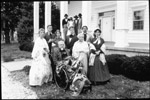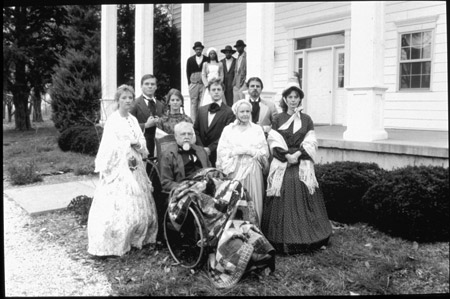C.S.A.: The Confederate States of America
 The film opens with a quote from George Bernard Shaw, “”If you’re going to tell people the truth, you better make them laugh; otherwise they’ll kill you.” Suffice it to say, the “British Broadcasting Service”-produced documentary begins with a television commercial for a fictitious company, Confederate Insurance. Trust me, when the camera pans over to the African-American raking leaves as the voice-over talks about “property,” it’s okay…
The film opens with a quote from George Bernard Shaw, “”If you’re going to tell people the truth, you better make them laugh; otherwise they’ll kill you.” Suffice it to say, the “British Broadcasting Service”-produced documentary begins with a television commercial for a fictitious company, Confederate Insurance. Trust me, when the camera pans over to the African-American raking leaves as the voice-over talks about “property,” it’s okay…

Kevin Willmott. Photo credit: Larry Levenson ©2006, IFC Films.
I’m certain this isn’t the first time someone’s pondered the question of, “What if the South won?” Here, Kevin Willmott puts forth his hypothetical answer to that question in the form of a mockumentary in the style of a Ken Burns history piece on PBS. I’m also certain I’m not the first critic to observe this, either.
I might, however, be one of a few progressives who wasn’t terribly impressed with this film. But, before you jump to the conclusion that I’d entirely dismissed the film as junk, allow me to separate the layers of analysis: the content, the technique and the argument. It’s important to separate these three components of the film because the respective merits or criticisms to each do not necessarily affect the other.
The film opens with a quote from George Bernard Shaw, “”If you’re going to tell people the truth, you better make them laugh; otherwise they’ll kill you.” Suffice it to say, the “British Broadcasting Service”-produced documentary begins with a television commercial for a fictitious company, Confederate Insurance. Trust me, when the camera pans over to the African-American raking leaves as the voice-over talks about “property,” it’s okay to laugh. The humor in much of the film doesn’t depend on you finding the enslavement and suffering of blacks funny, so much as it depends on finding the truth in the transient nature of morality and commercial enterprise’s willingness to exploit it. But that’s only funny until you realize you already knew this.
Various interviews with scholars, historians, politicians and various dramatizations (including several historical films produced in the anti-abolition context of this imaginary alternate universe) pepper the authoritatively-narrated pastiche. For example, instead of “Birth of A Nation,” D.W. Griffith enters the public consciousness through “The Hunt for Dishonest Abe,” in which a blackfaced actor portrays Abraham Lincoln attempting, after the North’s defeat, an escape to Canada in (ironically) blackface through Harriet Tubman’s underground railroad.
The story, however, centers on the dynastic power, wealth and influence of five generations of the Fauntroy family—the first of whom, John Ambrose Fauntroy (Larry Peterson), says of the black man, “To free him is to make him an orphan.” This seems, in fact, a lateral reference to D.W. Griffith’s response to accusations that he was racist, “To say that is like saying I am against children, as they were our children, whom we loved and cared for all of our lives.”
The interesting aspect of this family’s foray into the political arena isn’t in the toppling of Jefferson Davis’ presidency, but in the fact that the politically-motivated pro-abolitionist position taken by Lincoln-era Republicans skews the Democrats to the opposition—essentially pro-slavery. This realization, and its deconstruction by the various scholars in the program, is the one truly interesting subject of the film and, to the best of my recollection, the least explored angle in modern discourse out of the various hypotheses put forth in “C.S.A.” Then again, it would have been truly fascinating if the director were to thoroughly dissect the historical evolution of politics to present day, and its causes. That the film only glosses it is a detriment, because what we’re left with is largely the obvious assertion: Politicians go where the votes are.
The technique is also nothing new. The mockumentary is a vehicle of satire perhaps best used by its primary innovator, Rob Reiner, in “This is Spinal Tap,” a film so utterly hilarious (fiction as strange as the truth it represents) I shall never tire of referencing it. Here, technique interferes with the film’s argument because it’s attempting to satirize a history that didn’t occur. However, one working element this approach facilitates is a juxtaposition of ideas, images and events from (NOTE: light spoilers ahead) the real and imaginary worlds. Without being told, you are left to figure out which is fact and which is fabrication. A quick Google search of Dr. Samuel Cartwright and/or drapetomania, and you’ll know what I mean.
And then there’s the plausibility of the argument. The entire history is linked to the coin-flip of a singular event that, the film states but never substantiates, should the outcome have been different we would be living in Fauntroy’s timeline. Well, it’s never down to a singular event but, sometimes in the midst of other stirrings, one incident—e.g. the assassination of an Austrian archduke—can catalyze other forces into play. Again, this is all a hypothetical set of events so it is possible to accept it for what it is. However, as tempting as it may be to argue that myriad concomitant influences germinated by one seed can irreparably change the world, I’d contend that the absence of Einstein from history would only delay, not erase, the inevitable. Likewise, even this film’s imagined history concedes that the truth comes along sooner or later; history is itself a continuous series of changes one after another. At some point, the self-evident errancy of slavery—economically, morally and otherwise—was bound to hit the U.S. on the head. The film does tilt in that direction toward the end, and I won’t ruin it by telling you how, but the individual observations taken at face value are not the problem.
The fundamental miscalculation in this film is evident in one of its final moments as children are seen reciting the Pledge of Allegiance, finishing with “liberty and justice for all white people.” This parallel reality, from which we can comfortably distance ourselves isn’t nearly as abhorrent as the inexorable fact that the phrase “that all men are created equal” was written as it was because blacks were, at the time, viewed as property and not human beings. Cataloguing our own history of racism and subjugation of people different from ourselves is far more disturbing; far less distance exists between ourselves and Watts than between ourselves and Fauntroy. So, while you may find yourself surprised by a revelation here or there, on the whole I think you’ll find the entire affair doesn’t spear your conscience as deeply as you may have expected.
 C.S.A.: The Confederate States of America • Dolby® Digital surround sound in select theatres • Aspect Ratio: 1.33:1 • Running Time: 89 minutes • MPAA Rating: Not Rated. • Distributed by IFC Films
C.S.A.: The Confederate States of America • Dolby® Digital surround sound in select theatres • Aspect Ratio: 1.33:1 • Running Time: 89 minutes • MPAA Rating: Not Rated. • Distributed by IFC Films